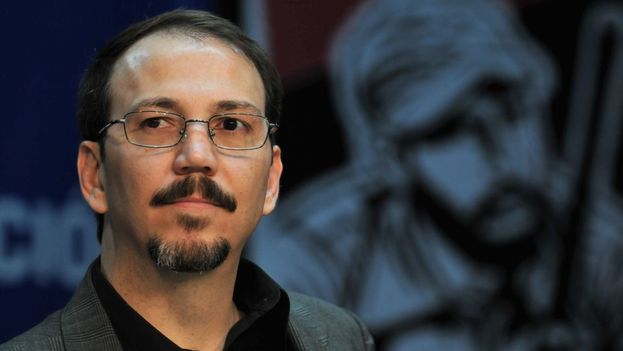
![]() 14ymedio, Havana, 25 January 2018 — With the publication, on Wednesday, of the list of candidates for the National Assembly of People’s Power, one of the great unknowns of the transfer of power in Cuba was clarified: the current president’s son, Alejandro Castro Espín, is not on the list and thus is automatically unable to legally rise to the Presidency of the Republic.
14ymedio, Havana, 25 January 2018 — With the publication, on Wednesday, of the list of candidates for the National Assembly of People’s Power, one of the great unknowns of the transfer of power in Cuba was clarified: the current president’s son, Alejandro Castro Espín, is not on the list and thus is automatically unable to legally rise to the Presidency of the Republic.
Castro Espin was identified by numerous analysts and opponents as a possible successor to his father, Raul Castro, who will leave his position as head of State on April 19. However, only members of parliament may occupy the presidency.
The 605 candidates listed in the official newspaper Granma must still be ratified in an electoral process convened for March 11. At this stage in Cuban elections there is a single candidate for each seat and voters may only choose whether or not to approve them. No names may be added or deleted.
If Raul Castro decided to make his son his successor as president, he would be violating the Electoral Law, the reform of which, announced in February 2015, has not yet been undertaken. According to Article 10 in paragraph F of the current law, to be eligible for the Council of State it is necessary to have been “previously elected as a Deputy to the National Assembly of People’s Power.”
The most recurrent hypothesis among analysts is that Raul Castro’s son, Alejandro Castro Espín, exerts the power behind the throne, acting as a “gray eminence” who, without sitting in the nation’s highest position, controls the country from the shadows.
Castro Espín, 52, is a colonel of the Ministry of the Interior (MININT) and is Raúl Castro’s only son. He is seen as a hard-liner and someone who would continue the politics practiced by his father. For the last five years he has been considered the true head of MININT, although he does not formally hold the title of Minister.
Speculation about the appointment of a “puppet president,” who will act in accordance with the interests of the family clan, has gained strength as the finalization of the new Parliament approaches.
One of the president’s daughters, sexologist Mariela Castro Espín, is included in the list of candidates for deputies of the National Assembly of People’s Power.
The list was published ten days after each province completed consultations on the proposed list of ‘pre-candidates’ for provincial delegates and deputies for each province. The national and provincial candidacy commissions previously prepared these lists, a method that allows them to politically filter the parliamentarians and to choose like-minded people who support the government.
The Electoral Law stipulates that roughly 50% of the 605 parliamentarians that make up the National Assembly are elected from among the constituency delegates, while the other half are proposed by mass organizations through their candidacy commissions.
___________________________
The 14ymedio team is committed to serious journalism that reflects the reality of deep Cuba. Thank you for joining us on this long road. We invite you to continue supporting us, but this time by becoming a member of 14ymedio. Together we can continue to transform journalism in Cuba.
